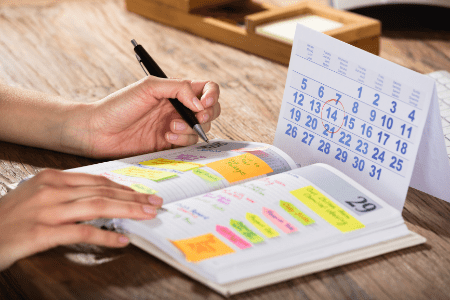Get Motivated: Study Tips From Our Student Panel
This month, we are launching our Good Student campaign to support learners who are starting their Higher Education journey. We recently consulted our Student Panel, which is made up of students from around the world, to find out what advice they had to share with incoming students. This week, read on for their advice on how to motivate yourself to study.

Think about the big picture
‘I would visualise obtaining my degree and walking the stage on my graduation day to stay motivated.’
Tying your day-to-day studying into a bigger goal was key to several of the students. One student wrote ‘I would visualise obtaining my degree and walking the stage on my graduation day to stay motivated.’ Other students wrote that they felt motivated by the idea that degree would help them make the world a better place and put them in a position to contribute to their community. A nursing student who took part in the study said that it was very motivating to ‘[know] that what you study is something that people are demanding.’ Another wrote that ‘it’s important to believe that what you’re doing is making an impact…find a way to link it to your future self.’ It is important to remember why you decided to take your course and what you hope it will lead to in the future.

Set up a study area
If you can, set up a dedicated study area. Having a dedicated space helps to train your brain to associate that space with studying, making it easier to focus. Think about what you need to be able to work – for most students, this is probably involves setting up a laptop and maybe some paper and pens in a quiet area where they have internet access. One student wrote that their top study advice was ‘find a place where you can study without distractions’. Be honest with yourself – do you study well in front of the TV? If you don’t have access to a private room to study in, and are trying to study somewhere where other people are relaxing, can you get ear plugs or noise-cancelling headphones to help you focus? For those who aren’t able to set up a permanent study area, you might find that the ritual of setting up your work area helps you get into a studying mind-set, whilst the ritual of dismantling it prepares you to switch off and relax.

Have a routine
‘I believe that “motivation is what gets you started, habit is what keeps you going.”’
Think about your daily or weekly routine. What activities are important to you? What times of day do you find it easiest to work? Planning ahead and giving yourself a structure that works for you helps you focus when it is time to study. Making the decision of when to study in advance means it is easier to get started when it is time for a study session, and can help you to turn studying into a habit. One panelist wrote: ‘I motivate myself to study by scheduling by daily activities with one-hour study sessions intermittently’. Scheduling in breaks and fun activities, as well as study sessions, can help you to fully relax and enjoy your downtime.

Reward yourself
Students reported using a variety of rewards as study motivation. Popular ideas included going for a walk, listening to music, or watching an episode of your favourite TV show. As a reward after regular study sessions, something that is cheap and easy to organise is ideal. For rewarding yourself after turning in an important assignment, you might want to treat yourself with something bigger – just make sure that organising the reward for studying doesn’t take up more time than the study session itself!

Join a study group
As many courses have been delivered in part or fully remotely during the pandemic, it is has been difficult for students to connect with their classmates. If you are able to, it can be very helpful to organise a regular group study session – this creates a structured time for studying with external accountability. Studying in a group also means that you can help each other with problems and share ideas. If you can’t meet up in person, you can join a group video call or have a group chat using a messaging app. Some groups prioritise accountability, holding video calls where they dial in and then work quietly, and others prioritise sharing ideas – have a go and see what suits you best!
We hope you found these tips useful. If you are interested in joining the Student Panel, visit our webpage for more information. If you have any study tips to share, we’d love to hear them! Comment below or email highereducation@cambridge.org.






